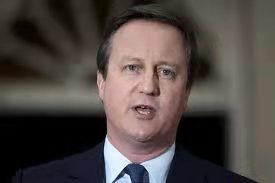



2013年1月23日,时任英国第75任首相(2010年至2016年)戴维·卡梅伦(David Cameron)发表了关于英国去留欧盟公投的演讲。该演讲的视频材料,被国际上多家英语培训机构选作其学生模仿标准英语的素材。我们也将该演讲的视频和音频选作《积极英语:精准模仿名人演说》的重要素材。我们将其文字材料先切分为六个部分,再切分为19节,依次刊载于“最佳图书100”主页的相关平台,供我们实验学校教学之用。
第1节
This morning I want to talk about the future of Europe.
But first, let us remember the past.
Seventy years ago, Europe was being torn apart by its second catastrophic conflict in a generation. A war which saw the streets of European cities strewn with rubble. The skies of London lit by flames night after night. And millions dead across the world in the battle for peace and liberty.
As we remember their sacrifice, so we should also remember how the shift in Europe from war to sustained peace came about. It did not happen like a change in the weather.
It happened because of determined work over generations. A commitment to friendship and a resolve never to revisit that dark past – a commitment epitomised by the Elysée Treaty signed 50 years ago this week.
After the Berlin Wall came down I visited that city and I will never forget it.
The abandoned checkpoints. The sense of excitement about the future. The knowledge that a great continent was coming together. Healing those wounds of our history is the central story of the European Union.
What Churchill described as the twin marauders of war and tyranny have been almost entirely banished from our continent. Today, hundreds of millions dwell in freedom, from the Baltic to the Adriatic, from the Western Approaches to the Aegean.
And while we must never take this for granted, the first purpose of the European Union – to secure peace – has been achieved and we should pay tribute to all those in the EU, alongside Nato, who made that happen.
But today the main, overriding purpose of the European Union is different: not to win peace, but to secure prosperity.
第2节
The challenges come not from within this continent but outside it. From the surging economies in the east and south. Of course a growing world economy benefits us all, but we should be in no doubt that a new global race of nations is under way today.
A race for the wealth and jobs of the future.
The map of global influence is changing before our eyes. And these changes are already being felt by the entrepreneur in the Netherlands, the worker in Germany, the family in Britain.
So I want to speak to you today with urgency and frankness about the European Union and how it must change – both to deliver prosperity and to retain the support of its peoples.
But first, I want to set out the spirit in which I approach these issues.
I know that the United Kingdom is sometimes seen as an argumentative and rather strong-minded member of the family of European nations.
And it’s true that our geography has shaped our psychology.
We have the character of an island nation – independent, forthright, passionate in defense of our sovereignty.
We can no more change this British sensibility than we can drain the English Channel.
And because of this sensibility, we come to the European Union with a frame of mind that is more practical than emotional.
For us, the European Union is a means to an end – prosperity, stability, the anchor of freedom and democracy both within Europe and beyond her shores – not an end in itself.
We insistently ask: How? Why? To what end?
But all this doesn’t make us somehow un-European.
The fact is that ours is not just an island story – it is also a continental story.
For all our connections to the rest of the world – of which we are rightly proud – we have always been a European power – and we always will be.
From Caesar’s legions to the Napoleonic Wars. From the Reformation, the Enlightenment and the Industrial Revolution to the defeat of Nazism. We have helped to write European history, and Europe has helped write ours.
Over the years, Britain has made her own, unique contrib
第3节
Britain is characterized not just by its independence but, above all, by its openness.
We have always been a country that reaches out. That turns its face to the world.
That leads the charge in the fight for global trade and against protectionism.
This is Britain today, as it’s always been: Independent, yes – but open, too.
I never want us to pull up the drawbridge and retreat from the world.
I am not a British isolationist.
I don’t just want a better deal for Britain. I want a better deal for Europe too.
So I speak as British Prime Minister with a positive vision for the future of the European Union. A future in which Britain wants, and should want, to play a committed and active part.
Some might then ask: why raise fundamental questions about the future of Europe when Europe is already in the midst of a deep crisis?
Why raise questions about Britain’s role when support in Britain is already so thin.
There are always voices saying “don’t ask the difficult questions”.
But it’s essential for Europe – and for Britain – that we do because there are three major challenges confronting us today.
First, the problems in the Eurozone are driving fundamental change in Europe.
Second, there is a crisis of European competitiveness, as other nations across the world soar ahead.
And third, there is a gap between the EU and its citizens which has grown dramatically in recent years. And which represents a lack of democratic accountability and consent that is – yes – felt particularly acutely in Britain.
If we don’t address these challenges, the danger is that Europe will fail and the British people will drift towards the exit.
【关联阅读】
温馨提示:横线象征链接。点击横线,直通链接。
 |
 |
|
学 习 辅 导 |
咨 询 热 线 |